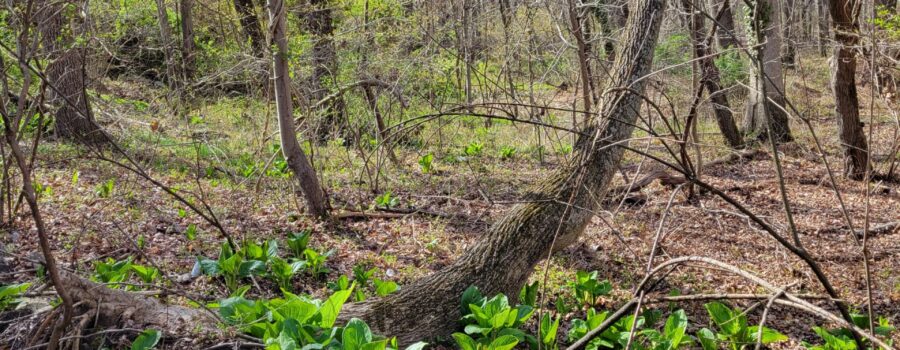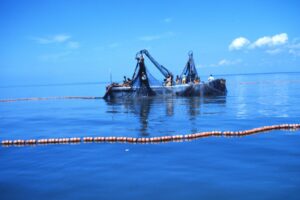The Contemptible Clearing of Abingdon Woods
By: Patrick DeArmey
Are 330 acres of forested wetlands and streams in the Bush River watershed more important than a 2 million square foot industrial warehouse complex? This was the question before the Maryland Department of the Environment (MDE) and Harford County when they granted various permits, plans, and other approvals “paving the way” for the destruction of hundreds of acres of forested wetlands and streams within Abingdon Woods in order to construct yet another massive industrial warehouse complex.
Abingdon Woods, which opens up to Otter Point Creek and the tidal Bush River, is the last significant, intact stand of forest in the Bush River watershed, which is highly impaired by pollution associated with rampant and relatively uncontrolled development in the area. MDE established this fact with the publication of numerous “pollution diets” or total maximum daily loads (“TMDLs”) for the Bush River, all of them a result of development within the watershed, with impairments caused by Total Suspended Solids, Chlorides, Sulfates, Habitat Alterations/Channelization, and lack of riparian buffers. Additionally, in 2013, MDE conducted a biological integrity study of the Bush River and found that its health, based on the richness of species and biodiversity, was low and that the entire watershed was impacted by what is termed “urban stream syndrome” which is common in watersheds like the Bush, where high percentages of impervious surfaces lead to polluted stormwater runoff negatively impacting water quality. Yet, despite all of this information established by MDE, the agency still approved the wetlands and waterways permit and determined that the project would not cause or even contribute to degrading water quality. If you think that this decision lacks common sense and goes against smart growth ideals and established ecological and scientific principles, you’re not alone.
CLA has represented the Gunpowder Riverkeeper for over three years in opposition to this project, our basic and most fundamental argument being that a project of this nature and scale will surely result in some negative impacts on the water quality of those streams affected within the Bush River watershed. CLA has assisted our client in advocating on both the county and state level in opposition to this project: we provided public comments and information to Harford County and MDE decision-makers; submitted extensive technical comments to MDE regarding the project’s wetlands and waterways permits; and assisted local community groups in drafting and submitting public comments in opposition, resulting in over one hundred comments to MDE opposing the permit and project. When the permit was approved by MDE, we filed suit on behalf of the Gunpowder Riverkeeper, and when it was determined that the permit had been approved without allowing the statutorily-required public notice and comment on core components of the permit, CLA filed, argued, and won a motion in Harford County circuit court, resulting in the Court remanding the permit back to MDE and requiring an additional public comment period. This was the first-ever motion of its kind filed and won in the Maryland Circuit Courts and it resulted in our client being able to submit additional public comments along with over 70 other comments from concerned members of the public, all in opposition to the project. And yet again, ignoring the science and public sentiment, MDE approved the permit. Consequently, we have continued our legal challenge of the permit, filing written memoranda and preparing for a hearing on the merits of the permit approval in Fall 2022.
Our work in Abingdon Woods is important because Maryland wetlands and water resources are diminishing daily as a result of state and local governments making uninformed, irrational, and shortsighted decisions that sacrifice our environment for projects with speculative economic benefits and short-term gains for out-of-state developers. It is also important because MDE’s decisions rarely meet the lofty goals and intentions spelled out clearly in state statutes and because destroying and altering wetlands, streams, floodplains, and their buffers in the name of economic development simply do not make sense and do not meet the state’s vocal goals as conservation and climate leaders. Finally, this work is important because developers don’t care about lawsuits or permit challenges, as evidenced in this matter. While our client’s case was pending and while others had challenged separate permitting aspects of the project, the developer commenced clearing the forest which in turn affected onsite water resources. Citizens and environmental groups have very limited and difficult avenues to stop these unscrupulous actions. By taking these cases, we demonstrate to the public and the legislature just how much our statutes and MDE have failed to protect the environment, which is further evidenced by the fact that nothing we nor anyone else did, despite the time and money invested, stopped the clearing of the forest before concerned groups and individuals with legal rights had their day to be heard in court.
Your donation today will help CLA continue this fight to protect what is left of Abingdon Woods and to ensure that projects of this nature and with these impacts that fail to protect Maryland’s valuable natural resources never get permitted.





